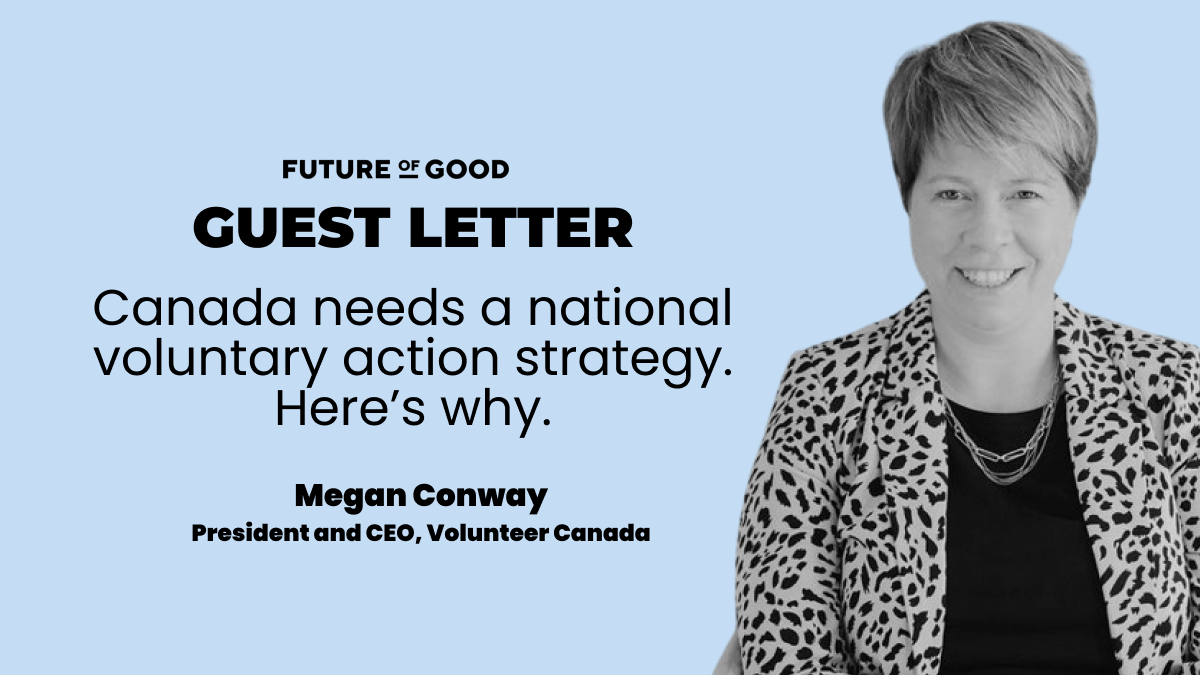Canada needs a national voluntary action strategy. Here’s why.

To start National Volunteer Week (NVW), I’m excited to share my perspectives on the tremendous value and impact generated by volunteers across the country. I’m also hopeful that this week presents an opportunity for leaders to reflect on why Canada needs new narratives that support and enable emerging models of participation and volunteerism. For Canada’s social recovery to truly take hold, the country needs to re-imagine the value it places on its volunteers. What if we recognize volunteering, bringing people together with the causes and challenges that matter most, as an essential element in social change?
This year’s theme for National Volunteer Week is Volunteering is Empathy in Action. As the new president and CEO of Volunteer Canada, the national organization that champions volunteerism, I am truly overwhelmed by the breadth and depth of volunteers who give generously of their time. I am especially hopeful about the conversations happening across the country to thank and champion volunteers. As part of National Volunteer Week, Volunteer Canada hopes to shine a light on why empathy in action is needed, especially now as we consider the future beyond the pandemic.
NVW is also an opportunity to move from recognizing empathy, and all the other motivations that encourage individual Canadians to volunteer, to re-imagining what system changes, new narratives and new models are needed to truly position volunteerism as a driver of a more connected, inclusive, and just Canada.
If the pandemic has taught us anything, it is that Canada is a nation of volunteers. Twenty-four million of us give back as volunteers every year, according to 2020 Statistics Canada data. We coach teams, mentor youth, donate our time to front-line organizations that support complex needs across our communities and abroad. We advocate for cleaner air and a better environment for our kids. We cook meals for sick relatives and shovel driveways for elderly neighbours. We give back through formal and informal volunteering in a myriad of ways. We continue to give our time, energy, and talent throughout the pandemic in new and profound ways to strengthen our communities and care for one another when we need it most.
Yet, despite this ongoing commitment to participate as activists, caregivers, and volunteers, we lack nuanced and progressive structural frameworks to support these emerging narratives on participation. Canada needs a new National Voluntary Action Strategy that will support and plan for the volunteers it needs today and in the future. A comprehensive and consultative framework for volunteers would:
- Redefine volunteerism to reflect the broad diversity of ways people volunteer and participate in their communities. In many ways, volunteering, as a term and concept, fails to encompass the broad ways people participate through service. Caregiving, helping, activism, mutual aid, and informal and formal volunteering – even the very Canadian COVID-borne term “caremongering”— are some emergent and relevant descriptions. Similarly, create new measurement and impact models to better articulate why these myriad models of volunteering matters for individuals, organizations, communities, and businesses.
- Address the systemic barriers that limit participation in volunteering. An example of an exclusionary practice is the cost and time involved with criminal record checks. Other barriers exist through recruitment practices for volunteering, or the time and costs associated with volunteering. A national strategy would begin to articulate these barriers and identify solutions to address them.
- Better engage and centre equity-seeking groups who have culturally grounded frameworks and diverse references for volunteerism. For example, there is no word for volunteering in many Indigenous languages. And yet, within many Indigenous communities there is a tremendous amount of active support for one another and for the land. As a white settler who leads a national charity, I realize there is more I must do to advocate and champion to address the limitations perpetuated in dominant models, networks, and frameworks.
- Strengthen policies, practices and structural supports that strengthen the diversity and quality of volunteering. Continue to invest in supports that meet the kinds of accelerating change and disruption facing our communities. We need to modernize how volunteers engage and to what end.
This National Volunteer Week, I am hopeful that we will seize the opportunity to imagine new models and frameworks for volunteering that will support our social, economic, environmental, and collective recovery from the pandemic. I am hopeful that Future of Good readers — and Canadians everywhere — have discussions during this National Volunteer Week about new and generative ways to care about one another, our communities, and our environment.
Megan Conway
President and CEO, Volunteer Canada

